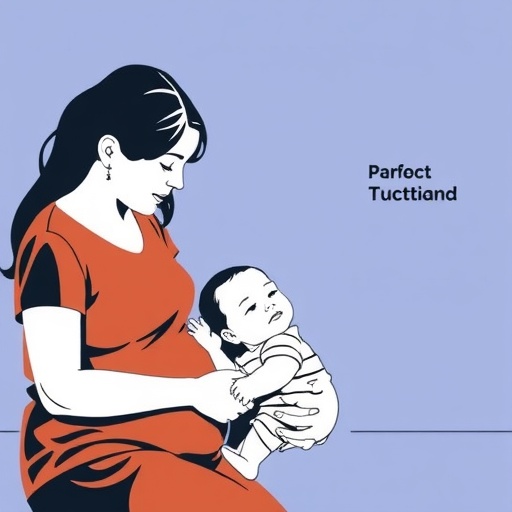In a groundbreaking study set to be published in the Journal of Child and Family Studies in 2025, researchers F. Koçoğlu, Ö. Aşcı, and M.D. Bal have delved into the complex relationships between perceived social support and maternal functioning among adolescent mothers. This critical examination seeks to illuminate the often-overlooked experiences of young mothers navigating the dual pressures of adolescence and parenting. The study’s findings are expected to have far-reaching implications for mental health professionals, social workers, and policymakers focused on improving support systems for young families.
Social support has long been recognized as a critical factor in mental health and overall well-being. For adolescent mothers, the support they perceive from their parents, peers, and community can significantly influence their parenting experiences and maternal development. This research emphasizes the importance of understanding how this support manifests and impacts their ability to engage in effective maternal functioning. The intricate relationship between social support and maternal responsibilities forms the basis of the study.
Through a rigorous cross-sectional design, the researchers analyzed data collected from a diverse group of adolescent mothers. Participants were recruited from various community centers, schools, and healthcare facilities, ensuring a representative sample of the population. The study utilized validated measurement tools to assess the level of social support perceived by participants, alongside various indicators of maternal functioning. These methodologies allowed for a nuanced exploration of the relationships between variables.
One of the novel aspects of this research is its focus on the unique challenges faced by adolescent mothers. Unlike older mothers, adolescent mothers often contend with societal stigmas, financial instability, and lack of access to resources and information. These factors can exacerbate feelings of isolation and vulnerability, making the need for robust social support networks even more pressing. The findings of this study may help elucidate the specific types of support that are most beneficial for these young mothers.
As the researchers dissect the data, initial analyses suggest that higher levels of perceived social support correlate positively with better maternal functioning outcomes. Mothers who reported feeling supported by their families and peers were more likely to show confidence in their parenting abilities, exhibit nurturing behaviors, and prioritize their children’s well-being. Conversely, those who felt unsupported often struggled with stress and anxiety, which adversely impacted their relationships with their children.
This study also addresses the role of different sources of support, highlighting that emotional, informational, and practical assistance can lead to varying outcomes for adolescent mothers. Emotional support, primarily derived from compassionate peers and family members, was found to be crucial in fostering resilience and coping mechanisms. In contrast, informational support—such as guidance on childcare practices—was linked to improved maternal skills and knowledge. These nuanced findings underscore the need for tailored intervention strategies.
Furthermore, the implications of this study extend beyond individual mothers to encapsulate broader societal concerns. Understanding the dynamics of social support among adolescent mothers can inform policies aimed at fostering healthier environments for young families. By promoting initiatives that enhance community support and resources for these mothers, stakeholders can play a vital role in shaping positive developmental outcomes for both mothers and children.
As the authors prepare to share their findings with the academic community and beyond, they stress the importance of collaboration between researchers, practitioners, and community organizations. Addressing the complex needs of adolescent mothers requires a multifaceted approach, wherein effective communication and shared resources can make a tangible difference. By creating environments that are conducive to healthy parenting practices, society can empower young mothers to thrive.
In conclusion, the study by Koçoğlu, Aşcı, and Bal contributes valuable insight into the significant role of perceived social support in shaping maternal functioning among adolescent mothers. By bridging gaps in existing literature, this research paves the way for future studies aimed at improving the support systems available to young mothers. As knowledge expands in this critical area, the ultimate goal remains clear: to foster healthier communities and enhance the lives of both mothers and their children.
The research encapsulates the myriad challenges faced by adolescent mothers while highlighting social support’s pivotal role in ameliorating these challenges. The forthcoming article not only sheds light on the vital data collected but also urges for a communal responsibility toward these young individuals. In essence, it calls for a re-evaluation of how society perceives and supports adolescent motherhood, advocating for systemic changes that create a network of understanding and assistance.
The collaborative efforts of the researchers offer a poignant reminder of the transformative power of support. By shining a light on the intricacies of adolescent motherhood and advocating for increased awareness, the study serves as both a clarion call and a beacon of hope for young mothers everywhere. In a world where the adolescent experience can be fraught with challenges, this research stands as a testament to the potential for social support to reshape lives positively.
With this innovative study on the horizon, the research community eagerly anticipates the robust discussion and dialogue it will undoubtedly foster in the fields of child development, maternal health, and social psychology. The impending publication of these findings encourages ongoing exploration into how best to nurture the next generation of mothers, ensuring they receive the support they need to flourish.
Subject of Research: The relationship between perceived social support and maternal functioning among adolescent mothers.
Article Title: Relationship Between Perceived Social Support and Maternal Functioning Among Adolescent Mothers: A Cross-Sectional Study.
Article References:
KOÇOĞLU, F., AŞCI, Ö. & BAL, M.D. Relationship Between Perceived Social Support and Maternal Functioning Among Adolescent Mothers: A Cross-Sectional Study.
J Child Fam Stud (2025). https://doi.org/10.1007/s10826-025-03160-6
Image Credits: AI Generated
DOI:
Keywords: Adolescent mothers, social support, maternal functioning, child development, mental health.




